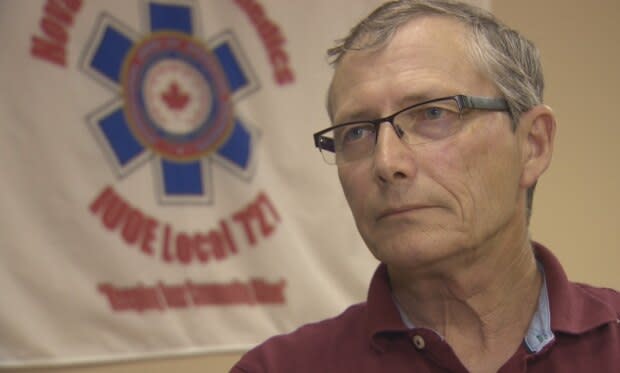Rural island communities calling for changes to N.S. ambulance service
People living on two rural islands in Nova Scotia say they want to see changes to their ambulance service after experiencing what they say are unacceptable wait times.
Residents on Brier Island and Long Island, about 70 kilometres from Digby, say they're used to waiting up to 90 minutes for an ambulance to show up when there is an emergency.
But now, they say the ambulance stationed on the islands appears to be away more frequently, moving to the mainland for coverage when other ambulances are unavailable. The health minister says no recent changes have been made to service in the area.
"It clearly feels like it's about saving money, not saving lives," said Helen Teed, a resident on Long Island who has been calling for community members to write to government officials for changes. "We feel like second-class citizens, we feel like our lives aren't valued.
"I think our government really needs to get on top of this ... We deserve to have a chance to live if we need help."

For 15 years, Teed was trained as a medical first responder working with the fire department on Long Island. She said medical first responders are not a replacement for paramedics.
"We are by no means a solution," she said. "We are just a Band-Aid basically to buy them time. With the amount of calls that we get, they're volunteers, they're not paid and they're certainly not trained."
Teed retired last year. She said while the long wait times aren't new, it's become "very frequently lately."
"I can tell you I have spent long waits with patients and no ambulance because it was pulled off the island to go elsewhere," Teed said.
Those wait times can be even longer if the emergency room in Digby is closed, meaning people must be taken to a hospital even farther away.
Brier Island resident has twice experienced long waits
Living a second ferry ride away on Brier Island, resident Cindy Titus said she has twice found herself waiting longer than she believes was acceptable for an ambulance. Both incidents, she said, were related to her husband's health.
"Once he was lobster fishing. He cut his finger, it was hanging, so of course I called the ambulance," she said.
The second time she said her husband was experiencing liver failure. She said both wait times were about 90 minutes.
Along with the long wait for an ambulance, Titus said none of the paramedics had the classification needed to administer any pain relief once they arrived. So her husband was sent to the hospital in Digby — over an hour away — in agony.
"I definitely want to have 24/7 coverage with paramedics who are licensed to give pain medication," she said.
She said she has sent emails and letters to several members of government, but has not received any response.

On Thursday, Health Minister Randy Delorey told reporters that the issue was brought to his attention in recent weeks by Environment Minister Gordon Wilson, MLA for Clare-Digby.
Delorey said he has asked staff to "dig in" and find out what's happening in the area.
"I can confirm there's been no structural changes, no policy changes to facilities and operations there," he said.
"So that means the work now to understand what concerns are being brought forward now from the community about services and service levels that we're just doing a deeper dive to see what the data shows about those concerns."
Delorey said he's been told there have not been changes since 2012 or 2013, when paramedics provincewide shifted from 24-hour shifts to 12-hour shifts.

But Terry Chapman, business manager for the International Union of Operating Engineers Local 727, which represents paramedics in the province, said the ambulances moving for coverage and the long wait times are a problem provincewide.
"We have for over two years been arguing with representatives of the House that the practice is unacceptable," Chapman said. "It's not only Long and Brier that suffers that.
"It's a system fault that has to do with many, many factors outside of just calling an ambulance and having one available. It falls to the offload delays at hospitals and ambulances without capability of staffing. It's a big issue."
Chapman said while the reallocation process is "relatively common," the employer, Emergency Medical Care Inc., does not provide system status data to the union.
The union has been calling to see a report done on Nova Scotia's ambulance system by Fitch and Associates, which Chapman said may include some recommendations to address these issues.
The health minister has promised to make the report public, however, Delorey said late last year that it could not be shared while the province and employer were in negotiations. A new contract for paramedics was finalized late last month.
EHS responds
In an email, a spokesperson for EHS said every effort is being made to keep paramedic resources in the island communities.
The statement said call volumes have recently been high across the province "for a variety of reasons."
"Due to the high call volume there are times paramedic crews must leave the community to cover the system, which is designed to move and flex as demands require," it said. "This means when a paramedic crew needs to come off the island, another crew is on its way to provide coverage, which is part of the dynamic deployment plan that EHS employs across the province."
The statement said the EHS Medical Communications Centre is able to provide instructions for care over the phone, and communications officers are able to stay on the phone until a paramedic arrives in some cases.
It also said staffing levels in the area are good, "however staffing is complex and multifaceted."
"We are always looking at ways to make the system better and more effective," the statement said.
Meanwhile, Teed said she's asking island residents who experience a long wait time to file a report to EHS and to continue writing to government officials.
"If we are complacent, they're just not going to send the ambulance down anymore and just come when there's a call," she said. "And that's not right."
MORE TOP STORIES


